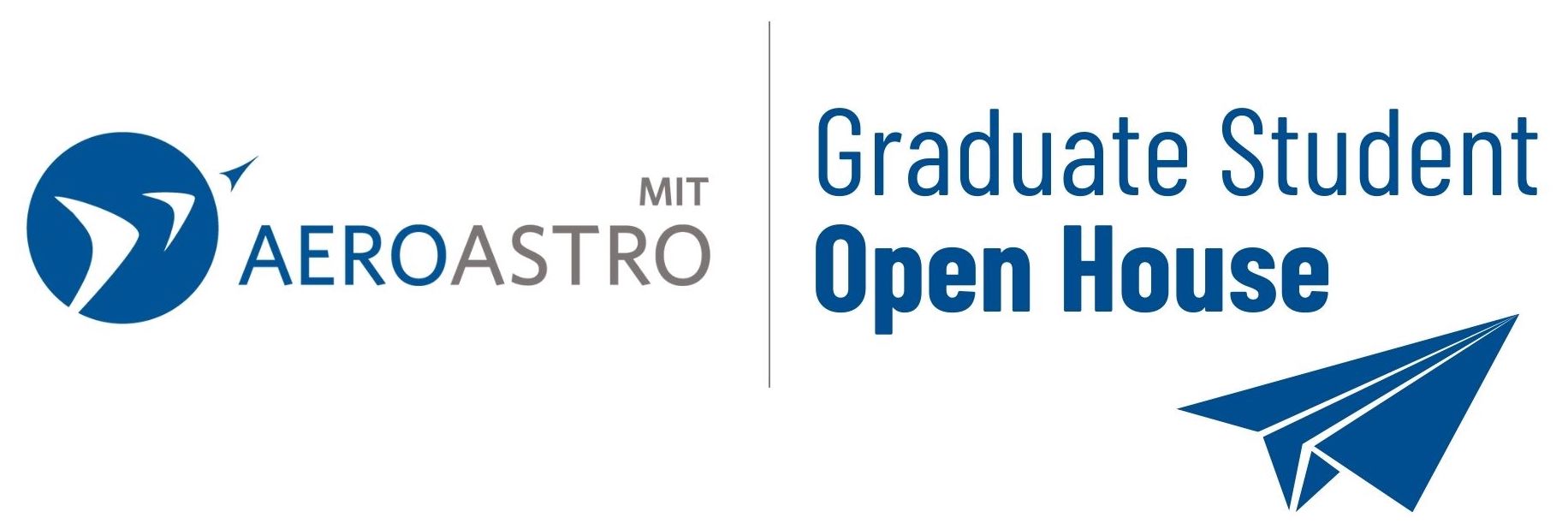Open House 2024
Faculty Office Directory and Map

CONTINENTAL BREAKFAST
Seamans Lounge
Hosted by Headquarters

DEPARTMENT AND ACADEMIC REQUIREMENTS OVERVIEW
33-116
9:00 – 9:45 a.m. | Department Overview: Steven Barrett, Department Head
9:45 – 11:00 a.m. | Academic Requirements Overview: Jon How, Graduate Committee Chair

GRADUATE HOUSING AT MIT
Ashley Kennedy, Director of Communications and Marketing, Division of Student Life, Housing & Residential Services
Mei Nichols, Assignment & Marketing Associate, Housing & Residential Services

WELCOME TO AEROASTRO FROM THE STUDENT SERVICES TEAM
Erinn Taylor Barroso & Rachael Draper, Graduate Program Administrators
Beata Shuster, Student Services Assistant

LUNCH with AeroAstro Faculty
Seamans Lounge
Hosted by Headquarters

STUDENT LIFE
33-116
Format: Presentation & Panel
Managed by: Student Ambassadors, Student Leadership Groups

OPEN BLOCK
Faculty Meetings
Lab Tours
Student Meetings
AEROASTRO DEPARTMENT TOUR

STUDENT SOCIAL
Roxy’s/A4cade

BREAKFAST WITH STUDENT LEADERSHIP AND STUDENT AMBASSADORS
Seamans Lounge
Meet AeroAstro student groups!
AeroAfro
ALAS
GA3
GWAE
QuASAR

OPEN BLOCK
Faculty Meetings
Lab Tours
Student Meetings
AEROASTRO DEPARTMENT TOUR

“HOW TO CONDUCT EXCELLENT RESEARCH” PANEL
Dr. Marshall Galbraith, Research Engineer
Professor Raul Radovitzky, Associate Director, MIT Institute for Soldier Nanotechnologies
Assistant Professor Lonnie Petersen, Human Systems Lab
Virtual Department tours
Coursework is a significant part of your graduate student experience. In order to give our newly admitted students a sense of some of our course offerings, we recorded a series of lectures in spring 2022. The lectures, as well as their descriptions, can be viewed below. To see the full list of current Course 16 class offerings, visit the MIT Registrar’s website.
16.36 Communication Systems and Networks
Lecture: Prof. Eytan Modiano
Introduces the fundamentals of digital communications and networking. Topics include elements of information theory, sampling and quantization, coding, modulation, signal detection and system performance in the presence of noise. Study of data networking includes multiple access, reliable packet transmission, routing and protocols of the internet. Concepts discussed in the context of aerospace communication systems: aircraft communications, satellite communications, and deep space communications. Students taking graduate version complete additional assignments.
16.235: Design with High Temperature Materials
Lecture: Prof. Zachary Cordero
Introduction to materials design for high-temperature applications. Fundamental principles of thermodynamics and kinetics of the oxidation and corrosion of materials in high-temperature, chemically aggressive environments. Relationship of oxidation theory to design of metals (iron-, cobalt-, nickel-, refractory- and intermetallic alloys), ceramics, composites (metal-, ceramic- and carbon-matrix, coated materials). Relationships between deformation mechanisms (creep, viscoelasticity, thermoelasticity) and microstructure for materials used at elevated temperatures. Discussions of high-temperature oxidation, corrosion, and damage problems that occur in energy and aerospace systems.
16.522 Space Propulsion
Lecture: Prof. Paulo Lozano
Reviews rocket propulsion fundamentals. Discusses advanced concepts in space propulsion with emphasis on high-specific impulse electric engines. Topics include advanced mission analysis; the physics and engineering of electrothermal, electrostatic, and electromagnetic schemes for accelerating propellant; and orbital mechanics for the analysis of continuous thrust trajectories. Requires a term project in which students design, build, and test an electric propulsion thruster in the laboratory.
16.332 Formal Methods for Safe Autonomous Systems
Lecture: Prof. Chuchu Fan
Covers formal methods for designing and analyzing autonomous systems. Focuses on both classical and state-of-the-art rigorous methods for specifying, modeling, verifying, and synthesizing various behaviors for systems where embedded computing units monitor and control physical processes. Additionally, covers advanced material on combining formal methods with control theory and machine learning theory for modern safety critical autonomous systems powered by AI techniques such as robots, self-driving cars, and drones. Strong emphasis on the use of various mathematical and software tools to provide safety, soundness, and completeness guarantees for system models with different levels of fidelity.



